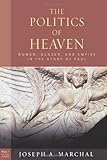The Politics of Heaven : women, gender, and empire in the study of Paul / Joseph A. Marchal.
Material type: TextSeries: Paul in critical contextsPublication details: Minneapolis, MN : Fortress Press, c2008.Description: xiii, 213 p. ; 24 cmISBN:
TextSeries: Paul in critical contextsPublication details: Minneapolis, MN : Fortress Press, c2008.Description: xiii, 213 p. ; 24 cmISBN: - 9780800663001 (alk. paper)
- 0800663004 (alk. paper)
- 227.06082 22 MAR
| Item type | Current library | Call number | Status | Barcode | |
|---|---|---|---|---|---|
 Open Shelf Books
Open Shelf Books
|
Bishop Bukenya Library Open Access / General collection | 227.06082 MAR (Browse shelf(Opens below)) | Available | 155464 |
Includes bibliographical references (p. 181-204) and index.
Introduction : interpretation at the intersection of approaches. Context ; Starting points and parameters : feminist and postcolonial analysis ; Paul, Philippians, and the plan of this book -- Histories of interpretation and "people's history" in Pauline studies. Initial inquiries and imperial intersections in interpretation (Introduction ; Gaps, erasures, and conflicts ; Procedure and precedent) ; People's possibilities : subaltern history and problems of perspective (People's history and Pauline studies ; Genealogies, genders, gaps, and geopolitics in people's history ; Back to the biblical : antiquity and feminist, postcolonial approaches) -- A hymn within and a heavenly politeuma. Introduction ; A heavenly politeuma and a hymn within ; Rhetorical interactions and Pauline interpretation : a postcolonial Paul? ; Initial connections and conclusions -- The rhetorics of imitation and postcolonial theories of mimicry. Imitation rhetorics in Paul and in Pauline scholarship ; The promise and perils of postcolonial mimicry ; Post-poning any undue celebrations : criticisms, cautions, and calibrations of postcolonial mimicry ; Resistance, risks, and replications : on the limits of mimicry for a feminist, postcolonial analysis -- Women in the contact zone. Contact zone and transcultural interactions ; Pauline travels and the Philippian contact zone ; Euodia and Syntyche : reconstructing co-workers in the contact zone -- Concluding reflections and connections. Reviewing the present project ; Elaborating further possibilities.
Was Paul an opponent of imperialism or a participant in the patriarchal social codes of his day? Joseph A. Marchal moves beyond this too-simple dichotomy to examine the language of power and obedience, ethnicity, and gender in Paul's letters.
There are no comments on this title.
